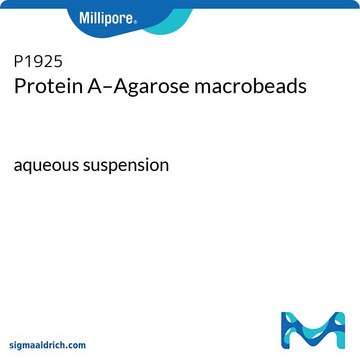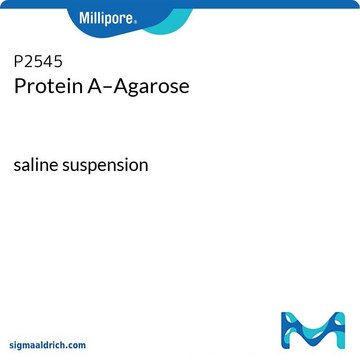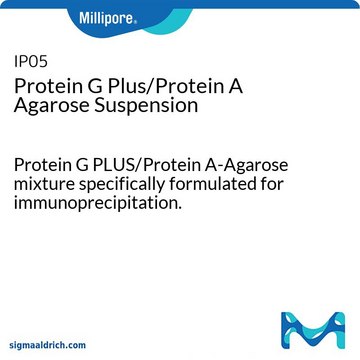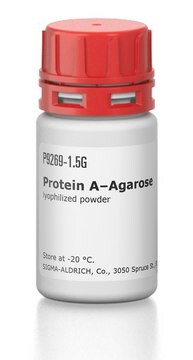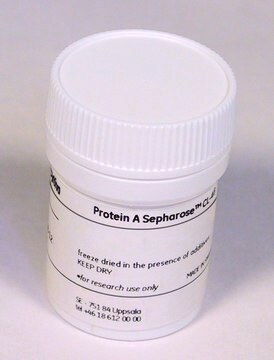IP02
Protein A Agarose Suspension
Protein A Agarose Suspension designed for immunoprecipitation applications
Se connecterpour consulter vos tarifs contractuels et ceux de votre entreprise/organisme
About This Item
Code UNSPSC :
41116133
Nomenclature NACRES :
NA.56
Produits recommandés
Forme
slurry (Liquid)
Contient
≤0.1% sodium azide as preservative
Fabricant/nom de marque
Calbiochem®
Conditions de stockage
do not freeze
Conditions d'expédition
wet ice
Température de stockage
2-8°C
Catégories apparentées
Description générale
Designed for immunoprecipitation applications. This product is blocked with BSA to reduce non-specific binding and cannot be used for purification; best for mouse IgG2a and IgG2b and rabbit IgG.
Protein A conjugated to agarose.
Avertissement
Toxicity: Standard Handling (A)
Forme physique
In PBS.
Autres remarques
Agarose solutions are supplied ready-to-use for immunoprecipitation. Use 15 µl suspension/µg primary antibody. Protein A-Agarose is recommended for use in immunoprecipitation assays using rabbit polyclonal antibodies or unmodified mouse IgG2a or IgG2b monoclonal antibodies. Mouse IgG1 or IgG3 and all rat antibodies bind poorly to Protein A. As an alternative, use Protein G PLUS, Protein G PLUS/Protein A, or rabbit second-step antibodies to bridge these antibodies to Protein A. Preclearing will minimize extra bands resulting from nonspecific precipitation. To preclear, add to the sample 20 µl of agarose conjugate and 1 µg of normal IgG from the same species as the immunoprecipitating antibody. When immunoblotting is used for detection, some secondary antibodies can react nonspecifically with BSA or other proteins present at high concentrations in the sample. This can be eliminated by reducing the concentration of secondary antibody.
Informations légales
CALBIOCHEM is a registered trademark of Merck KGaA, Darmstadt, Germany
Code de la classe de stockage
11 - Combustible Solids
Classe de danger pour l'eau (WGK)
WGK 1
Point d'éclair (°F)
Not applicable
Point d'éclair (°C)
Not applicable
Certificats d'analyse (COA)
Recherchez un Certificats d'analyse (COA) en saisissant le numéro de lot du produit. Les numéros de lot figurent sur l'étiquette du produit après les mots "Lot" ou "Batch".
Déjà en possession de ce produit ?
Retrouvez la documentation relative aux produits que vous avez récemment achetés dans la Bibliothèque de documents.
Les clients ont également consulté
Jonah Beenstock et al.
Molecular and cellular biology, 36(10), 1540-1554 (2016-03-16)
Many enzymes are self-regulated and can either inhibit or enhance their own catalytic activity. Enzymes that do both are extremely rare. Many protein kinases autoactivate by autophosphorylating specific sites at their activation loop and are inactivated by phosphatases. Although mitogen-activated
Derek W Stouth et al.
American journal of physiology. Cell physiology, 314(2), C177-C190 (2017-11-03)
Protein arginine methyltransferase 1 (PRMT1), PRMT4, and PRMT5 catalyze the methylation of arginine residues on target proteins. Previous work suggests that these enzymes regulate skeletal muscle plasticity. However, the function of PRMTs during disuse-induced muscle remodeling is unknown. The purpose
Lanlan Wei et al.
Biochemical and biophysical research communications, 368(2), 279-284 (2008-01-29)
The recruitment of the bromodomains of CREB-binding protein (CBP) and p300 by the acetylated myogenic transcription factor MyoD was previously shown to be critical for the enhanced MyoD transcriptional activity following acetylation at its Lys99 and Lys102 positions. However, the
Ajay Bhargava et al.
eLife, 5 (2016-02-18)
The Reproducibility Project: Cancer Biology seeks to address growing concerns about reproducibility in scientific research by conducting replications of selected experiments from a number of high-profile papers in the field of cancer biology. The papers, which were published between 2010
Vineet Kumar Maurya et al.
Journal of ovarian research, 7, 32-32 (2014-03-19)
Polycystic ovarian syndrome (PCOS) is characterized by the presence of multiple follicular cysts, giving rise to infertility due to anovulation. This syndrome affects about 10% of women, worldwide. The exact molecular mechanism leading to PCOS remains obscure. RhoGTPase has been
Notre équipe de scientifiques dispose d'une expérience dans tous les secteurs de la recherche, notamment en sciences de la vie, science des matériaux, synthèse chimique, chromatographie, analyse et dans de nombreux autres domaines..
Contacter notre Service technique



